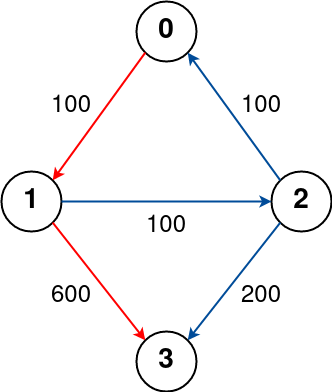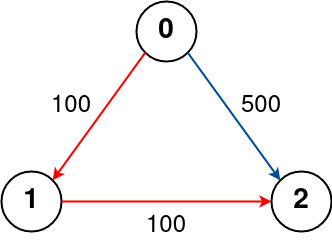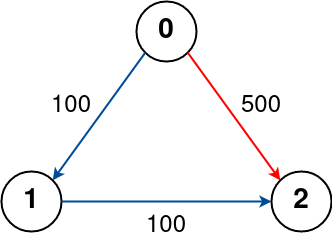There are n cities connected by some number of flights. You are given an array flights where flights[i] = [fromi, toi, pricei] indicates that there is a flight from city fromi to city toi with cost pricei.
You are also given three integers src, dst, and k, return the cheapest price from src to dst with at most k stops. If there is no such route, return -1.
Input: n = 4, flights = [[0,1,100],[1,2,100],[2,0,100],[1,3,600],[2,3,200]], src = 0, dst = 3, k = 1 Output: 700 Explanation: The graph is shown above. The optimal path with at most 1 stop from city 0 to 3 is marked in red and has cost 100 + 600 = 700. Note that the path through cities [0,1,2,3] is cheaper but is invalid because it uses 2 stops.
Input: n = 3, flights = [[0,1,100],[1,2,100],[0,2,500]], src = 0, dst = 2, k = 1 Output: 200 Explanation: The graph is shown above. The optimal path with at most 1 stop from city 0 to 2 is marked in red and has cost 100 + 100 = 200.
Input: n = 3, flights = [[0,1,100],[1,2,100],[0,2,500]], src = 0, dst = 2, k = 0 Output: 500 Explanation: The graph is shown above. The optimal path with no stops from city 0 to 2 is marked in red and has cost 500.
1 <= n <= 1000 <= flights.length <= (n * (n - 1) / 2)flights[i].length == 30 <= fromi, toi < nfromi != toi1 <= pricei <= 104- There will not be any multiple flights between two cities.
0 <= src, dst, k < nsrc != dst
use std::collections::VecDeque;
impl Solution {
pub fn find_cheapest_price(n: i32, flights: Vec<Vec<i32>>, src: i32, dst: i32, k: i32) -> i32 {
let n = n as usize;
let src = src as usize;
let dst = dst as usize;
let k = k as usize;
let mut to_cities = vec![vec![]; n];
let mut deque = VecDeque::from([(src, 0)]);
let mut min_prices = vec![vec![i32::MAX; n]; k + 2];
let mut ret = -1;
min_prices[0][src] = 0;
for f in &flights {
to_cities[f[0] as usize].push((f[1] as usize, f[2]));
}
while let Some((from, stops)) = deque.pop_front() {
if stops > k {
break;
}
for &(to, price) in &to_cities[from] {
if min_prices[stops][from] + price < min_prices[stops + 1][to] {
min_prices[stops + 1][to] = min_prices[stops][from] + price;
deque.push_back((to, stops + 1));
}
}
}
for i in 0..=k + 1 {
if min_prices[i][dst] != i32::MAX && (ret == -1 || min_prices[i][dst] < ret) {
ret = min_prices[i][dst];
}
}
ret
}
}

